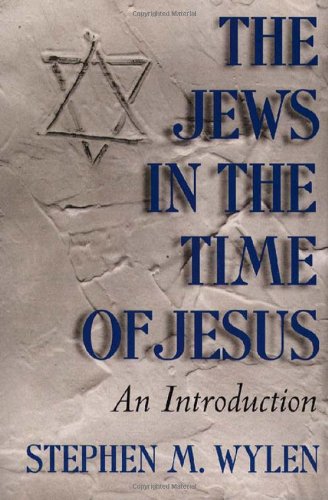Book review: The Jews in the Time of Jesus
by Stephen M. Wylen
★★★★★
This book is now fifteen years old, but it remains one of my favorites, and I wanted to share it. Stephen Wylen is a rabbi at Temple Beth Tikvah, Wayne, NJ, and I so enjoyed his book that I asked him to contribute a back-cover blurb for my own book. He did even more: he contributed a full review: http://www.dubiousdisciple.com/reviews. I’m indebted to him, but luckily, his is an easy book to recommend.
Jesus was a Palestinian Jew, and this book does a great job of describing the world Jesus lived in. His world can hardly be understood without some background of Jewish history, both political and religious. The two are interrelated: As the Jews were surviving the period of the Maccabees and Hellenistic integration, they were also seeing the age of prophecy transition into Messianism and Apocalypticism. Wylen spends a great deal of time discussing first-century Judaism: the Synagogue, Sabbath observance, ritual purity, and so on. Jewish understanding of God, Satan, Logos, and their practice of prayer and worship differed from neighboring nations, but did not escape subtle influences. Judaism itself was also fragmented, between Sadducees, Essenes, Zealots and Pharisees.
Wylen also discusses the trial of Jesus. From what the Mishnah tells us about Jewish law there are some problems with the trial story as it stands. For example, the gospels say that the Sanhedrin found Jesus guilty of blasphemy, yet none of Jesus’ words or deeds are blasphemous according to Jewish law. Nor could Jesus have been tried on a capital offense in the manner told in the gospel. According to the Mishnah there were many judicial rules designed to protect defendants accused of a capital crime. The trial had to be held before a full court. The sentencing and hearing had to occur during daylight hours. They could not convict on the day of the trial, as described.
For these reasons and more, Wylen concludes Jesus must have been tried by a kangaroo court called together by the high priest Caiaphas, acting on orders from the Romans. Pilate then convicted Jesus of being a revolutionary and sentenced him to crucifixion, just as he slaughtered numerous other innocent Jews.
Wylen delves into why Jesus was killed, whether Pilate was guilty or innocent, how the crowd felt about Jesus, and how much of the passion story is historically true. An excellent and informative book, written in an easy-to-understand style.












 354 Circles
354 Circles
 603 Goodreads Friends & Fans
603 Goodreads Friends & Fans

 Hello! I'm an author, historical Jesus scholar, book reviewer, and liberal Christian, which means I appreciate and attempt to exercise the humanitarian teachings of Jesus without getting hung up on any particular supernatural or religious beliefs.
The Bible is a magnificent book that has inspired and spiritually fed generations for thousands of years, and each new century seems to bring a deeper understanding of life’s purpose. This is true of not only Christianity; through the years, our age-old religions are slowly transforming from superstitious rituals into humanitarian philosophies. In short, we are growing up, and I am thrilled to be riding the wave.
I avidly read all thought-provoking religion titles. New authors: I'd love to read and review your book!
Hello! I'm an author, historical Jesus scholar, book reviewer, and liberal Christian, which means I appreciate and attempt to exercise the humanitarian teachings of Jesus without getting hung up on any particular supernatural or religious beliefs.
The Bible is a magnificent book that has inspired and spiritually fed generations for thousands of years, and each new century seems to bring a deeper understanding of life’s purpose. This is true of not only Christianity; through the years, our age-old religions are slowly transforming from superstitious rituals into humanitarian philosophies. In short, we are growing up, and I am thrilled to be riding the wave.
I avidly read all thought-provoking religion titles. New authors: I'd love to read and review your book!
 Hi! While Lee writes the articles and reviews the books, I edit, organize, and maintain the blog. The views expressed here are Lee's but I'm his biggest supporter! :-)
Hi! While Lee writes the articles and reviews the books, I edit, organize, and maintain the blog. The views expressed here are Lee's but I'm his biggest supporter! :-)
Connect With Me!